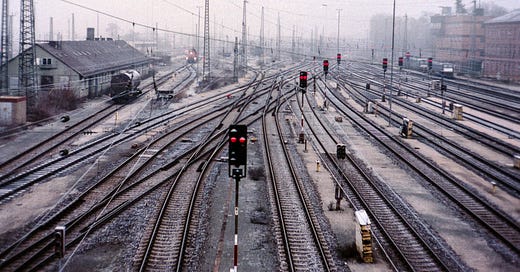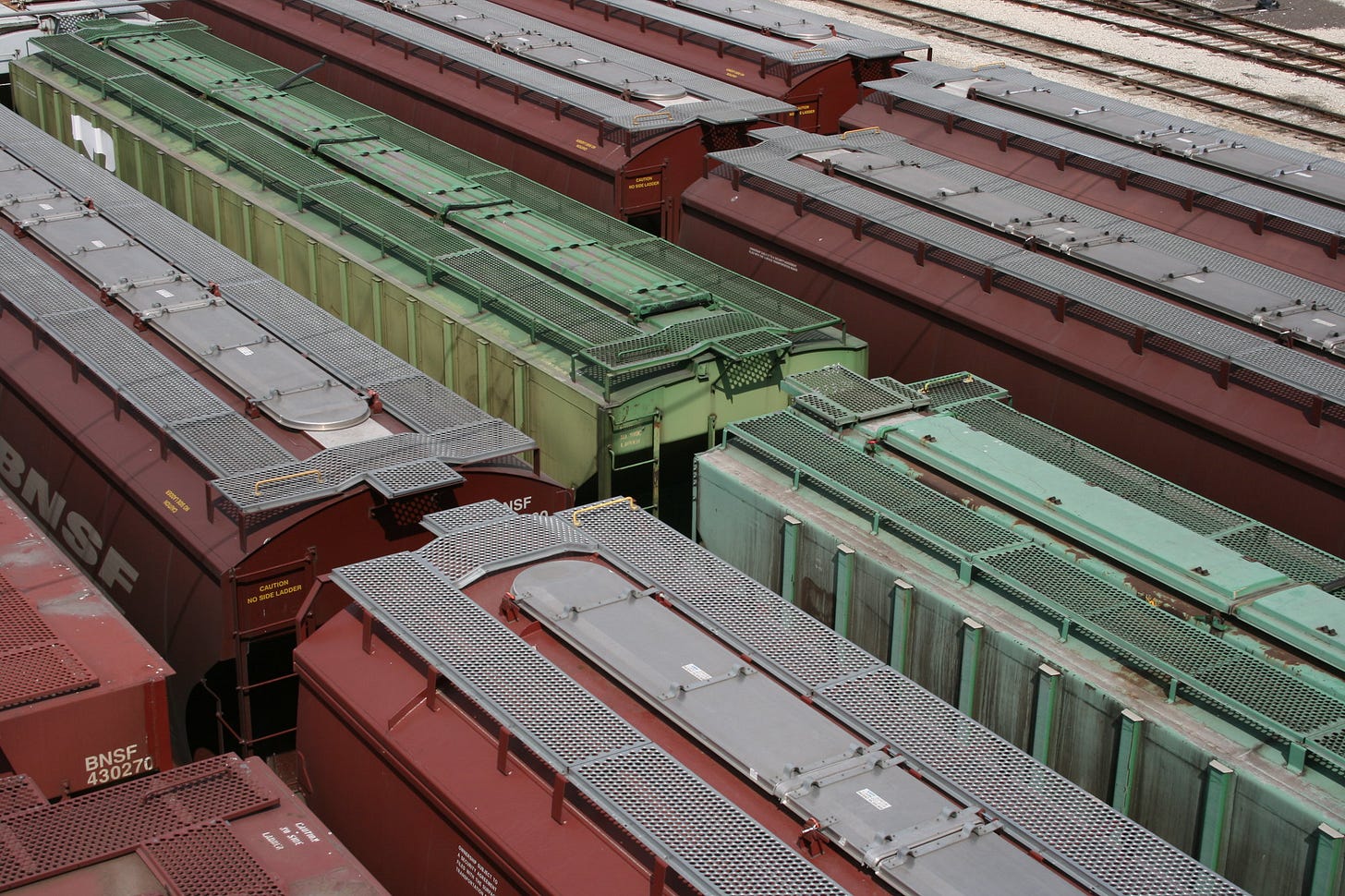Blockchain Is Revolutionizing A Lot More Than Finance
Building trust and efficiency in global supply chains
Blockchain technology, known for its uses in the financial sector, has growing application to other sectors of the economy, including trade, manufacturing, and transportation. Its promise? To make the way we manufacture, distribute, and consume products more efficient.
The Coal Harbor, Vancouver trainyard. Tdlucas5000/Flickr.
At its core, blockchain is a distributed ledger system—a decentralized and tamper-resistant digital ledger that records transactions across a network of computers. Each record, or "block," contains a data set, and once a block is added to the chain, it becomes immutable (unchangeable).
In the context of supply chains, blockchain acts as a secure and transparent record-keeping system. It allows multiple parties involved in the supply chain—from manufacturers and suppliers to shippers and retailers—to access a shared ledger. This shared ledger records every transaction and movement of goods, ensuring a reliable and secure history of each product's journey from origin to destination.
One of blockchain’s primary advantages in supply chains is that it provides transparency and traceability. The blockchain records every transaction, from the production of raw materials to the delivery of finished products. This level of transparency empowers consumers to trace product-origin, promoting authenticity and trust.
When buying organic coffee beans, for instance, blockchain can verify the beans' journey from the farm to your cup, confirming that promised standards are met. Such transparency is particularly crucial for industries where provenance and authenticity are paramount, such as organic food, luxury goods and pharmaceuticals.
The Union Station trainyard in Washington D.C. Jason OX4/Flickr.
Another of blockchain’s advantages is that it streamlines supply-chain processes, reducing reliance on manual record-keeping and paperwork. By automating and digitizing transactions, businesses can eliminate costly intermediaries and paperwork delays, leading to significant cost savings. Real-time tracking of goods ensures that inefficiencies and bottlenecks are swiftly identified and addressed.
Imagine a global pharmaceutical company that uses blockchain to monitor the production and distribution of medicines that require certain storage and delivery standards. With real-time data on medicines’ shipments and storage conditions, any deviation from the required temperature range can trigger an immediate response. This not only ensures product quality but also prevents costly waste.
Blockchain’s security features, including cryptographic encryption and consensus mechanisms, make it highly resistant to fraud and unauthorized alterations. This is a real game changer, as fraud prevention has been one of the most challenging problems for supply chains for many years.
In the diamond industry, for instance, blockchain technology’s gradual implementation is creating a transparent and unforgeable record of a diamond's shipment from the mine to the jewelry store.
Trains in the yard. 7263255/Flickr.
Blockchain offers an array of benefits, but it's not without its challenges and limitations. Integrating blockchain into existing supply chain systems can be difficult; legacy systems, data silos, and mixed technological infrastructures are not always compatible with blockchain technology. Resistance to change, especially from established industry players, is currently slowing down blockchain’s implementation.
Another challenge blockchain networks face is scalability when dealing with high transaction volumes. As supply chains expand, the blockchain must adapt to handle the increased load efficiently.
Data privacy and regulatory compliance pose yet another challenge. Industries like health care and pharmaceuticals, with strict data protection laws, require striking a fine balance between transparency and protection of sensitive patient information.
The evolving regulatory landscape for blockchain slows the technology’s full-scale integration into the day-to-day operations of some economic sectors. As governments contemplate how to regulate and tax blockchain transactions, the need for clear legal frameworks and industry standards becomes critical.
An empty trainyard. Johannes/Flickr.
Blockchain technology significantly affects supply chain innovation. Emerging trends, such as the integration of Internet-of-Things devices and the use of smart contracts, hold the potential to further streamline and optimize global supply chains.
As we observe global supply chains’ current fragmentation, we should not lose sight of forces reshaping the way we produce, distribute, and consume products, such as blockchain technology. Its potential to enhance transparency, efficiency and security will soon allow us to trade more efficiently than ever, but not without challenges. We must strike the right balance between this technology’s potential and real-world supply chain complexity. The question remains—will we seize this transformative opportunity and redefine global commerce’s future?









Probably not. The last thing politicians and bureaucrats controlling our lives want is transparency.